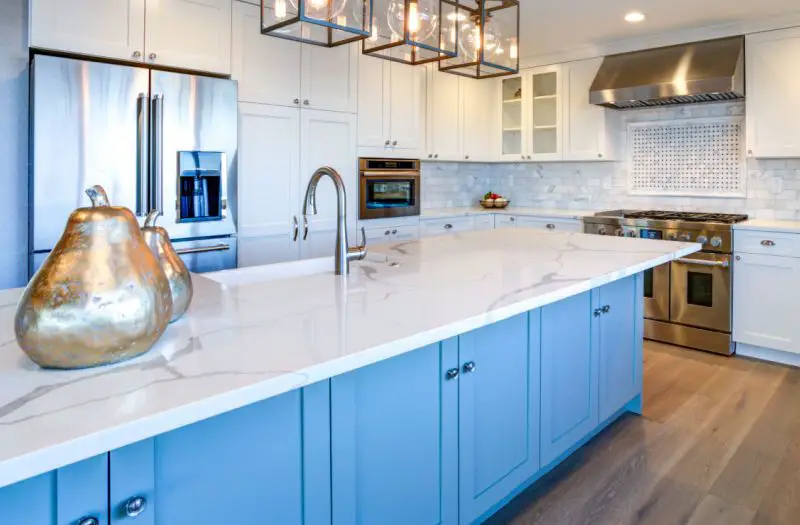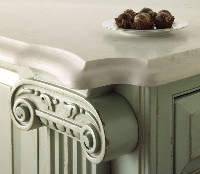The Complete Quartz Countertops Guide
Quartz countertops are considered the main competitor to granite as the best kitchen countertop material. When they research luxury kitchen remodeling ideas, most homeowners will compare quartz vs. granite countertops at some point. Both granite and quartz countertops are high-performance materials with similar properties; however, there are key differences to consider.

What is quartz countertop material?
Quartz countertop material is an engineered stone, made by combining 93% quartz (a natural stone element) with resin and pigments to create a durable slab. Known as Bretonstone technology, this patented process was pioneered by Marcello Toncelli in the 1970's. It involves vacuuming the mixture to remove air, vibrating and compressing it under pressure, and then curing it to create a dense, non-porous slab.
This man-made countertop material is resistant to scratching, staining, chemical discoloration, dullness from abrasion, and heat damage. It's available in a wider range of colors and patterns than natural stone. Quartz countertop slabs are available in similar sizes to slabs of granite countertop material.
PRO TIP: Quartz and quartzite are not the same. The similar names are confusing, but quartz is a man-made material and quartzite is a natural stone with patterning similar to marble.
Which are the best quartz countertops?

Brands that manufacture quartz countertops include Silestone, Avanza, Caesarstone (pictured above), Cambria countertops and Corian quartz countertops. Choosing one of these top brands ensures that homeowners will enjoy all of the benefits of quartz; the best quartz countertop manufacturers use the patented Bretonstone method to produce their quartz slabs.
While there are differences in color and pattern among the top brands, this high-performance material is comparable from one manufacturer to the next.
Be aware that in recent years, knock-off brands of quartz countertop material have hit the market, using an inferior manufacturing process that contains more resin and less of the hard quartz mineral. The result is a surface that is more prone to chemical discoloration, dullness from abrasion, stains, and heat damage. Be sure to check into the source and manufacturing process of any quartz countertop slab before making a purchase.
Engineered quartz material can also be used on flooring, wall cladding, tub decks and shower surrounds, providing durable options for other home projects.
Quartz Countertop Colors & Patterns
Quartz material offers many colors to choose from, with new color and pattern selections coming to market every year. Because quartz is man-made, manufacturers can respond to market demand Silestone, Cambria and the Zodiac quartz brand are producing designs that resemble less durable countertop materials like marble. Homeowners can have the look of white marble, gray marble or white granite countertops with the durability and stain resistance of quartz.
Quartz countertop colors have a consistency that few granite countertops can offer. For kitchen designs with bold-patterned countertops, or for waterfall counters, quartz is an ideal choice because it makes pattern-matching easy.
 Silestone Quartz countertops
Silestone Quartz countertopsQuartz Countertops Cost
Quartz countertops can cost anywhere from $60 to $150 per square foot; the price depends on which manufacturer is chosen as well as the pattern, thickness and edge finishing. In general, solid colors and uniform patterns are less costly, and marble-look quartz with bold patterning is the most expensive.
 Corian Quartz countertop
Corian Quartz countertopQuartz Countertop Cleaning & Maintenance
Quartz countertops are very easy to clean and maintain. Unlike natural stone, quartz is non-porous so it does not require sealing. Hot water and a sponge are sufficient for cleaning the countertops while cooking. Just like with granite, quartz should not be cleaned with soap because residue can build up and leave a dull film.
Since quartz countertops do not need sealing, homeowners may believe that they will not stain. Unfortunately, this is not true - even with top quartz brands. Many cleaners are too harsh for quartz and using bleach may cause permanent quartz countertop stains.
However, quartz countertops are non-porous and chemical-resistant, so you can use a mild countertop cleaning spray.
Since quartz countertops are derived from natural stone, the best and safest choice is a good stone cleaning product like the Granite & Marble Cleaner . This product also has optical brighteners to give your quartz extra shine.
To keep your quartz looking new, always use cutting boards for food prep and trivets for hot pans. Remember, quartz is heat and scratch resistant, but it's not heat proof; it can be damaged by hot pans or repeated contact with sharp objects.
To learn more about caring for quartz countertops, check out the best cleaning and polishing products for quartz.
For a thorough discussion of everything you should and shouldn't do to keep all your countertops in great shape, be sure to visit our Granite Care & Cleaning page.
Quartz vs. Granite Countertops
To help you learn about the differences between granite and quartz countertops, we've put together this Countertop Comparison.
Quartz Countertop Questions & Answers
Learn even more! Click on the links below to see questions submitted by other visitors with complete answers and great info.
Quartz Cleaning and Polishing Products
QUESTION: I know it's recommended to use dedicated stone cleaners on granite & marble.
But what about quartz countertops?
What are the best products …
Lime Etching on Quartz Countertops
QUESTION: First of all, thank you for a fantastic site.
We have a large kitchen tabletop. All we know is that it is an Engineered Stone quartz countertop. …
Water Etching on Black Quartz Countertops
QUESTION: What a great website! Thank you for being here.
Two years ago we chose black quartz countertops for our kitchen. We love it.
Recently …
Quartz Countertop Sealer Removal
QUESTION: I purchased white Caesarstone quartz countertops directly from a manufacturer, but I didn't realized they sealed the stone until it was installed …
Quartz Countertop Stain
Can quartz countertops stain? Ask most homeowners and they’ll likely say, "Nope. quartz is non-porous." The reality is that stains in quartz countertops …


